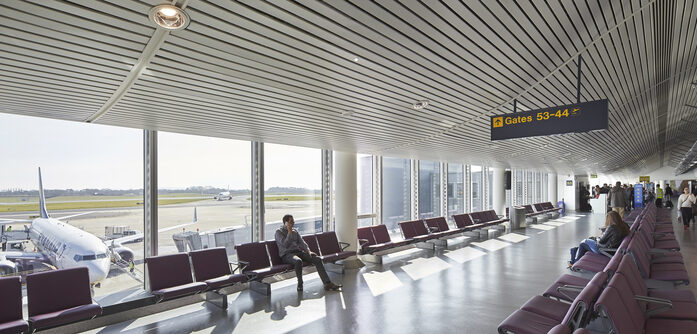Manchester Airports Group (MAG) has called on the UK government to carry out an urgent review of its new travel restrictions, in light of the 10-20% reduction in passenger numbers since the introduction of Day 2 PCR tests.
The Day 2 PCR tests were announced to the UK aviation sector on November 27, 2021, as an additional measure against the Omicron variant, alongside the pre-departure tests already in place. According to the MAG Group’s data, this new rule increased the already substantial impact that Covid-19 has had on each of its airports: Manchester, London Stansted and East Midlands. MAG airports welcomed 6.6 million passengers from April 1 to September 30, 2021, compared with 36.4 million for the same period in 2019. Losing these 29.8 million passengers led the group to a reported loss of £75.7m (US$99.9m) before interest and tax during the six-month period. By contrast, the group made £172.7m (US$227.9m) in profit for the same six months in 2019. Though the group saw year-on-year revenues increase by £64.9m (US$85.6m), this figure was down 70% on the same period two years ago. These figures showed that MAG passenger numbers remained 82% down on pre-pandemic levels in this period, despite initial early signs of recovery.
Charlie Cornish, CEO of MAG, said, “The first half of this year tells a story of how travel restrictions held back the recovery of UK aviation, especially when compared with the rest of Europe. As restrictions eased, passenger numbers grew steadily at all three of our airports. The reintroduction of costly and inconvenient travel testing requirements has created further uncertainty and delayed our recovery. The government has talked openly about the damage these restrictions cause to the travel sector, but neither they nor the opposition have recognized the critical need to support our industry in return.”
These initial signs of recovery – before the reinforced travel restrictions at the end of November – included an increase in passenger volumes across the group and resulted primarily from the resumption of leisure travel to the US. Passenger volumes in November were at 58% of 2019 numbers, the closest they have been to pre-pandemic levels.
Overall, MAG welcomed 2.7 million passengers in October 2021, which was the first month since February 2020 in which Manchester Airport and London Stansted Airport each served over one million passengers. Manchester Airport’s delayed opening of its new Terminal 2 extension in July 2021 aided this increase in passenger volume. London Stansted Airport served 3.5 million passengers between April and September, up 59% on last year. In September, this airport saw the return of 43% of its pre-pandemic traffic. Similarly, East Midlands Airport saw demand for its popular European holiday destinations return as restrictions eased, with numbers up 33% on 2020.
The resumption of leisure travel to the US on November 8 also looked positive for Manchester Airport’s long-haul network, following the return of long-haul services to the Middle East, Africa and Canada earlier in the year. With this change, Virgin Atlantic’s services to New York, Orlando and Atlanta resumed, as did Singapore Airlines’ service to Houston. This change also led to the completion of Aer Lingus’s base for direct long-haul services to Barbados and the US at Manchester Airport in December.
Therefore, when Sajid Javid, the UK’s Health Secretary, urged the government to complete its review of these measures as soon as possible, the MAG Group welcomed the announcement – eager to build on these initial signs of recovery. In particular, it embraced Javid’s statement on December 8 that there was “less need to have any kind of travel restrictions at all” once Omicron becomes the dominant variant.
Cornish said, “As a business, we will always do our part to protect public health, but we also need these temporary measures to be removed when they are no longer worthwhile. These restrictions may have slowed the arrival of Omicron but it is now transmitting in the community, and the government needs urgently to review whether the rapidly reducing benefit of testing justifies the damage it is causing to consumer confidence. MAG, and the wider UK travel industry, can be confident of a strong revival when travel restrictions are lifted. All we are asking for is to be able to plan for our recovery, and to be given the same chance that every other sector was given through the domestic roadmap earlier this year.”

